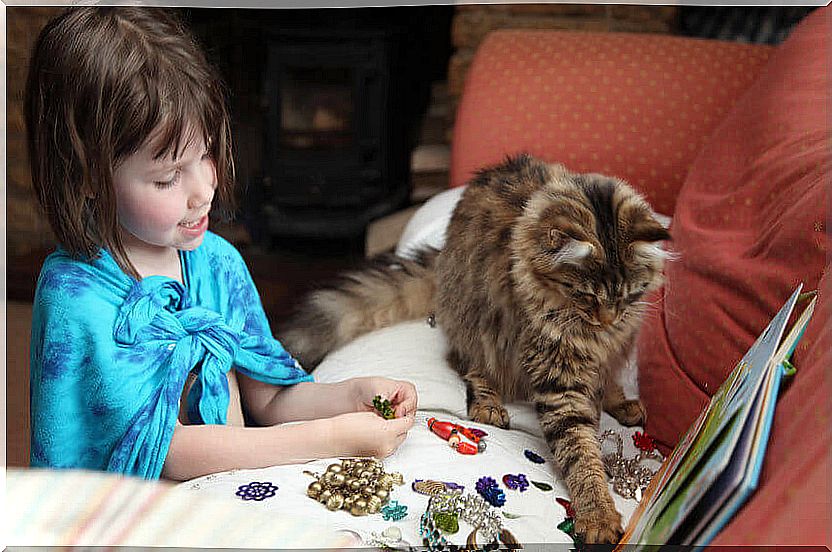Parents With Autism Spectrum Disorder, What Are They Like?

Parents with autism spectrum disorders are invisible in our society. If we are looking for studies and research papers, they always start from the pattern of “neurotypical parents caring for children with autism”. In a way, we are neglecting a reality that is more common than we realize and which has its own characteristics.
Statistical data warns us that more than 1% of the population could be on the autism spectrum. Such an event highlights the obvious fact that there are many people who have not yet been diagnosed.
The reason for this last point can be easily explained. We are dealing with a neurobiological condition with a wide manifestation of characteristics and needs (and not all of them are so obvious).
There are people with Asperger’s syndrome, others with Rett’s syndrome. There are patients with severe communication limitations who are very dependent.
There are also those who simply do not suspect that they are part of the spectrum. And there are men and women with highly functional autism who do not relate their limitations to this neurobiological reality.
Some of them have formed a family and have educational peculiarities that it is interesting to describe. Let’s analyze this together.

What Do Parents With Autism Spectrum Disorder Look Like?
Being on the autism spectrum doesn’t make you a bad parent. Simon Baron-Cohen, director of the Autism Research Center at Cambridge University makes it clear: it has finally been shown in the 21st century that people with autism are able to participate in all aspects of life, including parenthood.
We say this last point because of a remarkable fact. In 1988, Dr. Edward Ritvo, a psychiatrist at the University of California, submitted an article to the Journal of Autism and Developmental Disorders titled Eleven Autistic Parents . He has been refused publication up to ten times: he has been told that it is impossible for people with autism to have families.
Eventually, the doctor, Ritvo, had to change the title for his article to be accepted by the scientific community: Eleven “Possible” Autistic Parents . Until very recently, this condition was considered a serious and disabling disorder. Fortunately, that perspective has now changed. However, we need more progress.
We have an impressive body of research on children with autism, but not on adults with ASD. However, they exist, they are part of our society. They do their jobs, they have their dreams and goals, they build families, they have partners and, of course, they enjoy raising their children.
But what do parents with autism spectrum disorder look like? Let’s take a closer look.
Moms with autism are more likely to suffer from pre- and postnatal depression
One of the personalities who does the most research in this area is Dr. Simon Baron-Cohen mentioned above. He was the one who organized a major project to survey people with ASD who were parents around the world through social media.
It was found that autistic mothers were more likely to suffer from pre- and post-natal depression. Many of them feel overwhelmed and, above all, feel lonely. They usually lack the support to deal with the buildup of emotions they are feeling.
Parents with ASD experience stigma and pressure from their environment
Another characteristic of parents with autism spectrum disorders is the social pressure and stigma they suffer from. If they have been diagnosed, it is common for family, friends or co-workers to question their ability to take responsibility for parenting. Such a situation is experienced with great suffering.
The problem of being multitasking when taking care of a child
Multitasking is already a challenge for any nuclear or single-parent family. However, mothers and fathers with autism spectrum disorders face a more complex challenge.
Their mind always tends to focus deeply on one aspect. Having to monitor if the baby is crying, needs changing, doing housework, etc., can be very problematic. This is why they usually need to make lists to organize their daily tasks.
Overstimulation, a recurring problem
Crying babies, screaming older children playing, clutter, TV, console, etc. make many people on the autism spectrum feel overwhelmed. Overstimulation (sounds, lights, etc.) is a very stressful overload for them.
The problem of communication with the child’s social environment
In the investigation conducted by Dr. Baron-Cohen, an illustrative finding was made. Over 60% of mothers and fathers with autism spectrum disorders report difficulty communicating with teachers, doctors and other professionals caring for their children. It is all exhausting and very problematic.

Parents with Autism and the Problem of Not Being able to Meet All of a Child’s Emotional Needs
Parents with this disease love their children with as much dedication as anyone else. They take care of it and try to do what is best for their little ones like everyone else. However, they are aware that they are limited in certain dimensions.
They suffer, for example, from not being able to respond to the little ones when they have a tantrum. It is more difficult for them to give them support when they are frustrated, angry or sad.
Emotional education is a challenge for anyone, but even more so for the person with ASD. This is particularly problematic when the child reaches adolescence.
On the other hand, it is also worth noting a remarkable fact which was appreciated in this online research. It is common for fathers with ASD to exhibit – on average – an authoritative parenting style.
In short, we need two things. The first is to do more research into what autism looks like in adulthood.
The second is obvious. Care and support services should be developed for parents suffering from this pathology. The latter would thus appreciate the process much more and would feel more competent in the adventure of parenthood and education.









